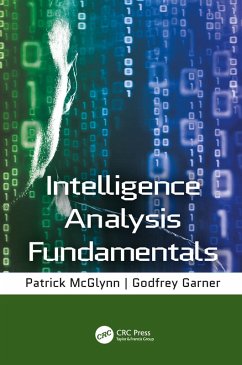
Intelligence Analysis Fundamentals (eBook, ePUB)
Versandkostenfrei!
Sofort per Download lieferbar
61,95 €
inkl. MwSt.
Weitere Ausgaben:

PAYBACK Punkte
31 °P sammeln!
There are a limited number of intelligence analysis books available on the market. Intelligence Analysis Fundamentals is an introductory, accessible text for college level undergraduate and graduate level courses. While the principles outlined in the book largely follow military intelligence terminology and practice, concepts are presented to correlate with intelligence gathering and analysis performed in law enforcement, homeland security, and corporate and business security roles. Most of the existing texts on intelligence gathering and analysis focus on specific types of intelligence such a...
There are a limited number of intelligence analysis books available on the market. Intelligence Analysis Fundamentals is an introductory, accessible text for college level undergraduate and graduate level courses. While the principles outlined in the book largely follow military intelligence terminology and practice, concepts are presented to correlate with intelligence gathering and analysis performed in law enforcement, homeland security, and corporate and business security roles. Most of the existing texts on intelligence gathering and analysis focus on specific types of intelligence such as 'target centric' intelligence, and many of these, detail information from a position of prior knowledge. In other words, they are most valuable to the consumer who has a working-level knowledge of the subject.
The book is general enough in nature that a lay student-interested in pursuing a career in intelligence, Homeland Security, or other related areas of law enforcement-will benefit from it. No prior knowledge of intelligence analysis, functions, or operations is assumed. Chapters illustrate methods and techniques that, over the years, have consistently demonstrate results, superior to those achieved with other means. Chapters describe such analytical methods that are most widely used in the intelligence community and serve as recognized standards and benchmarks in the practice of intelligence analysis. All techniques have been selected for inclusion for their specific application to homeland security, criminal investigations, and intelligence operations.
The book will be a welcome addition to the body of literature available and a widely used reference for professionals and students alike.
The book is general enough in nature that a lay student-interested in pursuing a career in intelligence, Homeland Security, or other related areas of law enforcement-will benefit from it. No prior knowledge of intelligence analysis, functions, or operations is assumed. Chapters illustrate methods and techniques that, over the years, have consistently demonstrate results, superior to those achieved with other means. Chapters describe such analytical methods that are most widely used in the intelligence community and serve as recognized standards and benchmarks in the practice of intelligence analysis. All techniques have been selected for inclusion for their specific application to homeland security, criminal investigations, and intelligence operations.
- Uses numerous hands-on activities-that can easily be modified by instructors to be more or less challenging depending on the course level-to reinforce concepts
- As current and active members of the intelligence community, the authors draw on their decades of experience in intelligence to offer real-world examples to illustrate concepts
- All methodologies reflect the latest trends in the intelligence communities assessment, analysis, and reporting processes with all presented being open source, non-classified information
- As such, the non-sensitive information presented is appropriate-and methods applicable-for use for education and training overseas and internationally
- Military-style collection and analysis methods are the primary ones presented, but all are directly correlated intelligence to current concepts, functions and practices within Homeland Security and the law communities
- Covers the counterterrorism environment where joint operations and investigative efforts combine military, private sector, and law enforcement action and information sharing
The book will be a welcome addition to the body of literature available and a widely used reference for professionals and students alike.
Dieser Download kann aus rechtlichen Gründen nur mit Rechnungsadresse in A, B, BG, CY, CZ, D, DK, EW, E, FIN, F, GR, HR, H, IRL, I, LT, L, LR, M, NL, PL, P, R, S, SLO, SK ausgeliefert werden.













